NAVIGATION COLUMN
Home Page
The Keninger Archives
The Propagander
Yahoo Groups:
History 1 Day 2
Nuremburg Data
Daily History Pages:
FAIR USE NOTICE: This site could contain copyrighted material the use of which has not always been specifically authorized by the copyright owner. We are making such material available in our efforts to advance understanding of historical, political, human rights, economic, democracy, scientific, environmental, and social justice issues, etc. We believe this constitutes a 'fair use' of any such copyrighted material as provided for in section 107 of the US Copyright Law. In accordance with Title 17 U.S.C. Section 107, the material on this site is distributed without profit to those who have expressed a prior interest in receiving the included information for research that could include educational purposes. If you wish to use copyrighted material from this site for purposes of your own that go beyond 'fair use', you could most likely need to obtain permission from the copyright owner.
|
August 12

1099 The Crusades: 1,000 Crusaders led by Godfrey of Bouillon, defeat an Egyptian relief column heading for Jerusalem. Note: Jerusalem had already fallen to the Crusaders, at the Battle of Ascalon.

1332 Disinherited Scottish barons under Edward Baliol defeat superior forces under David, King of Scotland at the Battle of Dupplin Moor, a Scottish dynastic battle.
1450 Hundred Years War: The English surrender Cherbourg, completing Charles VII's conquest of Normandy.

1508 Ponce de Leon arrives in Puerto Rico.
1530 Florence is restored to the Medicis by imperial troops after a siege of 10 months.
1553 Pope Julius III orders the confiscation and burning of the Talmud.
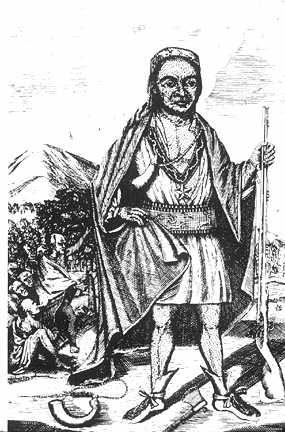
1656 "King Phillip's War" comes to an end with the killing of Indian chief King Phillip. The war between the Indians and the Europeans had lasted for two years.
1687 During the Ottoman Wars the Austrians under Louis of Baden and the Hungarians decisively beat the Turks under Mohammed IV in the Battle of Mohacz.

1753 Birth: Thomas Bewick, engraver, book illustrator (British Birds, Aesop's Fables). Died in 1828. Note: Researching this one was rewarding as I'd never heard of him before, but after perusing some 25 of his illustrations, I realized I'd seen at least half of them before, in one place or another. An intriguing aspect is that most all of his illustrations were very small, the size of a book page, but are filled with compelling detail and sophisticated perspective. When I have the time, I'll have to search out any more Bewick engravings available, while contemplating how the joy of learning new things tends to keep one young!
1759 Seven Years War: The Russians under General Soltikov and the Austrians under General Landon defeat 40,000 Prussians under Frederick the Great at the Battle of Kunersdorf.
1762 Birth: George IV, King of Great Britain and Ireland (1820-30). He is the eldest son of the insane George III and is named Prince Regent in 1810 when his father is declared insane. Note: His extravagances and the scandal surrounding his marriage to Caroline of Brunswick will make him an unpopular monarch.
1762 The British capture Cuba from Spain after a two month siege.
1774 Birth: Robert Southey, English poet laureate (1813-1843), biographer of Nelson.

1781 Birth: Robert Mills, architect and engineer whose designs include the Washington Monument, the National Portrait Gallery and the US Treasury Building.
1791 Black slaves on the island of Santo Domingo rise up against their white masters.
1812 British commander the Duke of Wellington occupies Madrid, Spain, forcing out Joseph Bonaparte.
1813 Austria declares war against Napoleon.
1820 Birth: Oliver Mowat, a founder of the Canadian Confederation.

1849 Birth: Abbott Thayer, American painter, credited with noting camouflage in the animal world, created camouflage pattern for military. Died in 1921. Question: Who created the recipe for the US Navy's first shark repellent?
1851 Isaac Singer of New York City patents the double-treadle sewing machine. Although a sewing machine had already been patented, Singer's sewing machine is revolutionary, having a double treadle. He set up business in Boston with $40 in capital.

1860 Klara Plozl, Adolf Hitler's mother, is born of a union between Hitler's maternal grandmother, Johanna Huettler (Hitler), and the farmer Johann Polzl, just thirty miles north of the blue Danube in the small village of Spital.
1862 US Civil War: General John Hunt Morgan and his raiders capture Gallatin, Texas.
1863 US Civil War: Confederate raider William Quantrill leads a massacre of 150 men and boys in Lawrence, Kansas.
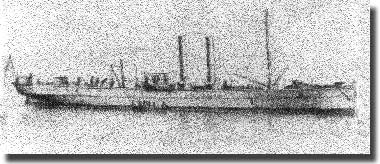
1864 US Civil War: After a week of heavy raiding, the Confederate cruiser Tallahassee claims six Union ships captured.
1865 Joseph Lister becomes the first doctor to use disinfectant during surgery. Note: Joseph Lister is the namesake of Listerine mouthwash.

1867 Reconstruction: US President Andrew Johnson sparks a move to impeachment when he defies Congress by suspending Secretary of War Edwin M. Stanton. Note: Johnson is making a stand for executive prerogative by not allowing the legislature to dictate his cabinet.

1877 Thomas Edison finishes his first phonograph design and hands the model of his invention to John Kreusi with instructions on how to build it. Kreusi, a confident man, bets the inventor $2 that there is no way that the machine will ever work. He looses the bet. Note: Edison will make the first sound recording when he recites the nursery rhyme Mary Had A Little Lamb into John's completed prototype.
1877 British explorer Sir Henry Morton Stanley reaches the mouth of the Congo River.
1896 Gold is discovered near Dawson City, Yukon Territory, Canada. After word reaches the United States in June of 1897, thousands of Americans head to the Klondike to seek their fortunes.
1898 Spanish-American War: The four month (three months and 22 days) war ends with the signing of a protocol by Spain and the United States. Spain relinquishes Cuba and cedes Puerto Rico, Guam and the Philippines to the United States. At the same time the Hawaiian Islands are formally annexed by the United States.
1908 The first Model T Ford motor car rolls out of the factory in Detroit, replacing the Model A. Costing just $900, the Model T brought its maker, Henry Ford, one step closer to fulfilling his dream to manufacture a popular vehicle that everyone could afford. The Model T owed its low cost to new techniques of mass production - breaking down the complex job of building a car into a succession of simple operations. The car was assembled so quickly that it was only in black, because black enamel was the only paint that dried fast enough. Known affectionately as Tin Lizzy, the Model T is an immediate success. 16.5 million Model Ts are found on the road in the next few years.
1914 WW1: Austrian troops numbering 200,000, commanded by Gen. Oskar Potiorek, cross the Sava and Drina Rivers and invade Serbia.
1929 Birth: Alvis Edgar.
1935 President Franklin Roosevelt signs the US Social Security Bill.
1936 Birth: John Poindexter, former US national security adviser, US Chief of Staff.
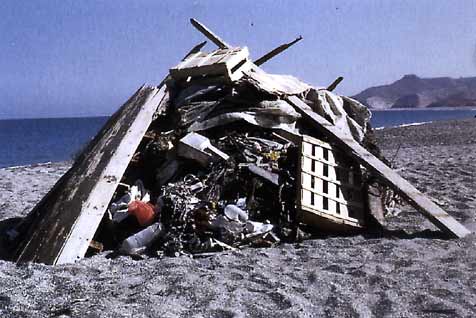
1936 Birth: Hans Haacke, in Cologne, Germany, artist (Right to Life, Dripper Boxes). Note: The above picture, 'Beach Pollution,' is the best example of this artists work (excepting perhaps a decidedly uninteresting clear plastic cube) that I am able to find. I'm not kidding.
1939 The British-French military mission begins talks in Moscow. They will continue until August 19, but no agreement will be reached because of a dispute over Soviet troops being allowed in Poland. (WWIIDBD)
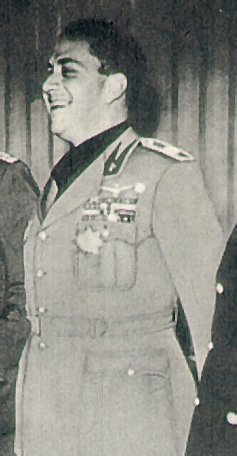
1939 Ciano meets with Hitler at Berchtesgaden. Hitler is pondering over his maps planning the war against Poland. Hitler believes that the war will be localized and there is not the slightest danger that Britain and France will fight. When Ciano protests that so little would be gained at such vast risk, Hitler says to him "You are a southerner, and you will never understand how much I, as a German, need to get my hands on the timber of the Polish forests." Ciano notes: "He has decided to strike, and strike he will."
1940 WW2: The Luftwaffe launches a large-scale bombing attack on six British radar facilities. Radar has become important to the British because it enables them to spot incoming bombers at great distances and alert the fighter squadrons to meet them. In this first surprise raid, five radar facilities are damaged and one destroyed. (Duffy)

1941 Those Vichy French: French Marshal Henri Philippe Petain announces full French collaboration with Nazi Germany.
1944 WW2: The first PLUTO (Pipe Line Under the Ocean) supplying fuel across the English Channel to the Allied forces in France, went into operation from the Isle of Wight. It could transfer up to 700 tons of fuel a day.
1944 The Warsaw Uprising: Churchill responds to desperate appeals from
Warsaw by sending 28 bombers with supplies from Italy. Stalin refuses use of Soviet airfields nearby.

1944 WW2: Joseph P. Kennedy, Jr, eldest son of former US Ambassador Joseph P. Kennedy, is killed when his PB4Y1 bomber, the Zootsuit Black, literally a flying bomb, loaded with 21,170 pounds of dynamite, explodes over the English Channel during a secret mission against German V-2 sites.
1945 WW2: Japanese leaders choose not to accept the Allied demand which amounts to unconditional surrender.
1945 Nuremberg War Crimes Trials: Major war criminals that had been housed in Luxembourg are flown to Nuremberg, where they are incarcerated in a prison adjacent to the Palace of Justice. (Maser II)
1953 The Soviet Union secretly tests its first hydrogen bomb.
1955 President Eisenhower raises the minimum wage from $0.75 to $1 an hour.
1959 The first ship firing of a Polaris missile takes place near Observation Island.
1960 The balloon satellite Echo One, the first communications satellite, is launched from Cape Canaveral, FL.

1960 USAF Major Robert M. White takes an X-15 to 41,600 metres altitude.
1962 The Soviet Union launches Pavel Popovich into orbit. Popovich and Andrian Nikolayev, who was launched a day before, both land on August 15.
1964 Death: Ian Fleming, a Commander in British Naval Intelligence during WW2 and later the author of the James Bond series of thrillers, in England of a heart attack at the age of 56.
1969 The Nam: American installations at Quan-Loi, Vietnam, comes under Viet Cong attack.
1970 The Soviet Union and West Germany sign a nonaggression pact in Moscow.
1971 Syria breaks off diplomatic relations with Jordan and refuses its air space to all air traffic bound for Amman after the conflict between the government and Palestinian guerrillas.
1972 The Nam: The last American combat ground troops leave Vietnam.

1977 High Energy Astronomy Observatory 1 is launched into Earth orbit.
1977 The inappropriately named Enterprise, a US space shuttle that will never see space, makes its first test flight, gliding off the back of a jet and landing safely on the ground.
1978 China and Japan sign a historic treaty of peace and friendship in Peking.
1981 IBM introduces the PC and PC-DOS version 1.0.
1983 Argentina releases British assets seized during the Falklands war of 1982.
1987 President Reagan, in his first television address since the Iran-Contra hearings, says 'mistakes were made' and that he'd been stubborn in pursuing a policy that went astray.
1990 Desert Shield: The first US casualty occurs during the Persian Gulf crisis when Air Force Staff Sergeant John Campisi died after being hit by a military truck.
1990 Desert Shield: Playing to the crowd, Iraq President Saddam Hussein says he is ready to resolve the Gulf crisis if Israel withdraws from occupied territories.
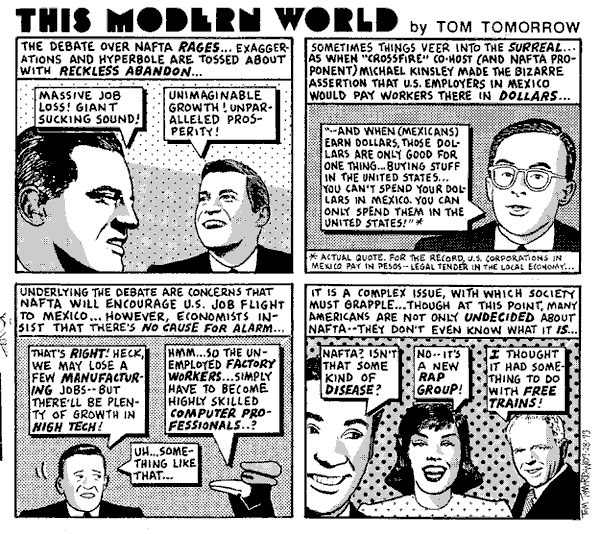
1992 NAFTA: The US, Canada, and Mexico announce that the North American Free Trade Agreement has been created after 14 months of negotiations.
1996 Delegates to the Republican National Convention pass a platform calling for a constitutional amendment against abortions.
1996 Iran and Turkey strike a huge gas supply deal worth $23 billion just a week after a new US law penalizing foreign investment in Iran's energy sector.
1998 Holocaust: The two largest Swiss banks agree to pay $1.25 billion as restitution to World War II Holocaust victims.

2002 Post 911: FAA releases the chronology of 911 airspace.

2002 Post 911: Work continues on the World Trade Center Site.
2004

^ Top of Page ^
Click Here to email the Webmaster of this site.
Web Page Design by Nathan
This page was last updated on August 26, 2005
|
